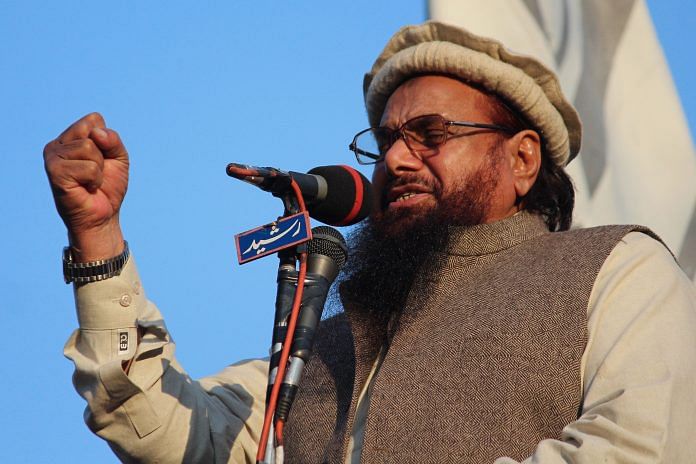New Delhi: With international pressure continuing on Pakistan to act against terror organisations operating from its soil, its National Counter Terrorism Authority (NACTA) Tuesday blacklisted Jamaat-ud-Dawa and its wing Falah-e-Insaniat Foundation under the country’s Anti-Terrorism Act 1997.
The move, however, may not yield much.
Since its creation in 2009, NACTA has been a largely insignificant agency with neither any real powers nor any success to show. Far from achieving any of its mandates, NACTA has emerged as an agency marked by turf wars and bureaucratic hustling.
As its latest move makes headlines, ThePrint takes a look at the history of NACTA and where it stands today.
What is NACTA?
NACTA is Pakistan’s internal counter-terrorism agency. It was established in 2009 and worked under the interior ministry.
Four years later, the agency was reconstituted and given financial and administrative autonomy through the NACTA Act of 2013.
The agency is accountable to a set of Board of Governors (BoG), comprising the top-most civilian and military leadership.
Its objective is to implement the anti-terrorism “20-point National Action Plan” and facilitate coordination among the civilian government, military, intelligence agencies and provincial police administrations.
Also read: Pak takes over assets of 2 outfits linked to Hafiz Saeed, hand behind 2008 Mumbai attacks
Why did it fail?
In its decade-long history, NACTA has failed to achieve any of its stated objectives and there are a number of reasons for this.
First, from the very point of conception, NACTA was in an administrative limbo. Although the agency was established in 2009, the NACTA Act defining its legal structure only came about in 2013.
Second, post-2013, NACTA emerged as a ground for severe turf wars between various agencies and ministries, as The Nation reported.
The provincial police administrations were reluctant to compromise their operation autonomy and follow the orders of a federal agency. The intelligence agencies of the armed services were also apprehensive to play a second-order role.
Additionally, throughout the Nawaz Sharif regime, there was constant tussle between the Prime Minister’s Office and Chaudhary Nisar Ali Khan’s interior ministry to bring NACTA under their respective control.
Third, one of the important objectives of NACTA was intelligence collection. Its ability to succeed here was crippled by two factors.
To begin with, NACTA remains severely understaffed. In 2018, out of its 300 posts, only a little over 50 were filled. But more importantly, while NACTA had the mandate to collect intelligence, it had no jurisdiction to conduct group operations. Thus, its intelligence collection abilities were severely constrained.
Fourth, and perhaps NACTA’s biggest structural issue is its exceptionally large BoG, which includes the prime minister. Given the military-civilian discord in Pakistan, the agency has been rendered completely dysfunctional.
Also read: Pakistan bans Hafiz Saeed-led Jamat-ud-Dawa & its charity wing Falah-e-Insaniat
No meetings in nine years
The agency has remained so dysfunctional that through the first nine years of its existence, the BoG never formally met. The meetings were often postponed and then cancelled.
The first meeting of NACTA’s BoG was convened only last year, in August 2018, by Prime Minister Imran Khan, The Nation had reported.
Several news reports suggest that Khan had complained about NACTA being a useless organisation. And the post-meeting comments by his Finance Minister Mohammad Ishaq Dar seemed to acknowledge how NACTA has been completely dysfunctional.
Talking to the press after the August 2018 meeting, Dar had said, “Today it was a general discussion that how NACTA can be made a real operational organisation.”
Also read: Act against terrorists like Hafiz Saeed if serious about talks, India tells Pakistan
What does a NACTA blacklist mean?
Pakistan’s counter-terrorism policies are driven completely by the military and an agency like NACTA has no real role to play there. More importantly, Pakistan’s counter-terrorism operations, at best, only target anti-Pakistan groups.
“NACTA has been around for many years now, without doing much except for rehashing such lists,” Taha Siddiqui, Pakistani journalist and founder of Safe Newsrooms, told ThePrint.
“There has been some action against some of the groups on those lists, but the ones that have been deemed anti-Pakistan — for example the Pakistani Taliban or the Baloch rebel groups or the international terror organisations targeting Pakistani interests like Al Qaeda etc — have faced action by Pakistani authorities,” said Siddiqui.
“Many of these organisations pose no threat (for now) to the Pakistani state, but since they are causing trouble in the region, they are proscribed, but on paper only. On the ground, after being proscribed, many of them re-branded themselves, coming up with new names and continuing business as usual,” the Pakistani journalist said about the futility of blacklisting a group.
Shedding light on the updated NACTA list blacklisting 26/11 attack mastermind Hafiz Saeed-led JuD, Siddiqui said, “JuD has already started to operate under the banner of TaJ (Tehreek Azad Jammu Kashmir) as we saw this 5th of February, when it organised protests across Pakistan.
“The faces of the leadership are the same but the names keep changing. It’s an old tactic by the Pakistani militant groups, and the state knows is, but does little to discourage it, which points towards their complicity.”




All bunkum and farce not worth wasting time and resources discussing.
PM Khan’s finance minister is Asad Umar, not Ishaq Dar.